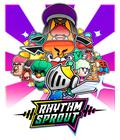Rhythm games are a genre where everything seems acceptable. It doesn't matter if you choose to give your game a story or just be one giant playlist of songs. Having big licenses matters very little, and the same goes for having likable characters. So long as the act of hitting beats feels right, the game can do little wrong. Rhythm Sprout does everything it can to stand out from other games, but it also nails down the basics.
You play the role of Sprout, a tracksuit-wearing knight who happens to be an onion in a land populated by vegetables. One day, you're summoned by King Brock to save the kingdom from the impending evil of King Sugar Daddy and save his daughter. Being someone who refuses to talk, you have no choice but to go adventuring.
The demo shows off the kind of story you're dealing with, and it is anything but serious. In the first stage, King Brock calls you from a payphone and calls you lazy. He forgets about his daughter before thanking you for a good talk. One of the villains challenges you to reach the end of the demo, or you'll be forced to watch a "Gilmore Girls" marathon with him. It's silly stuff but works as a nice break between the playable parts.
This rhythm game uses a three-button setup. If you're using a controller, this means that the d-pad hits the yellow notes, the shoulder buttons hit the blue notes, and the face buttons hit the red notes. Thus far, there are no held notes, and while you have moments where differing notes are hit in rapid succession, you won't have to hit two differently colored notes at the same time.
What makes this different from other rhythm games is that there aren't a finite number of notes to hit before you finish the level. Instead, because the music is perfect for loops, every successful note you hit counts as a step forward, and the level ends when you reach the goal, regardless of how many notes are ahead of you. If you run into an enemy, the game plays out differently; you're tasked with dwindling the enemy's note count to zero. You take damage with any misses, and the game ends when you make too many misses and your energy is depleted.
It is a solid system, and playing through one level shows that the developers have the basics down. The music is a great mix of genres like rock and lo-fi hip-hop that sounds great on its own but are still good to rhythmically tap to. The game comes with a good deal of options for syncing up the audio and visuals, so there's no lag when hitting notes. Both the lands and enemies are varied enough that the journey remains exciting.
At the moment, the only flaw with the game is the screen shake. Every note you hit causes you to take a small step forward, which causes the screen to shake. Getting into combat does the same thing as successful note hits, so the screen also shakes with a dodge or attack. For most people, this works well as a tool to keep you on the beat, but for those who are more sensitive, it can be disorienting enough to cut down your play sessions to a few songs at a time. An option to get rid of the shake would be helpful to ensure that everyone can play for longer sessions.
Even this early on, Rhythm Sprout works perfectly on the Steam Deck. The game defaults to a high preset, but that is enough to give you roughly 3.5 hours of playtime on one charge from a full battery. The game runs at a solid 60fps, and there's no hitching or stutters, which can be a deal-breaker for a rhythm game. Unless something drastic happens over time, this works almost flawlessly on Valve's handheld.
The demo for Rhythm Sprout proves that it has what it takes to be a memorable rhythm adventure. The mechanics are tight, and the story is funny enough that you'll want to see it through to the end. There's no tentative release date for this, but we are interested in seeing how it plays out whenever it finally does get released.
More articles about Rhythm Sprout











 Rhythm Sprout features handcrafted rhythm action with original music and a wacky story mode.
Rhythm Sprout features handcrafted rhythm action with original music and a wacky story mode.

















